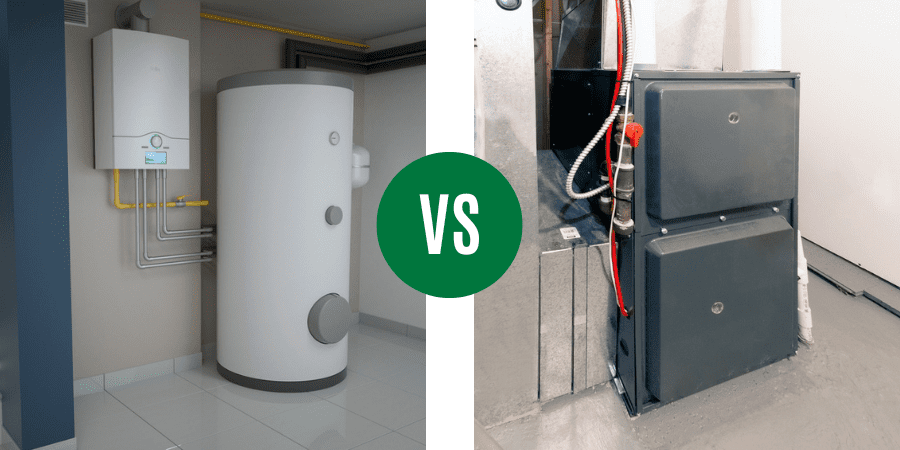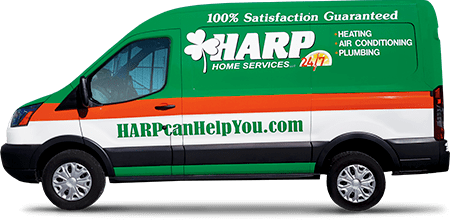
Most homeowners in the US have a boiler heater or a furnace to heat their homes. Continually improving technology is increasing boiler heaters’ efficiency, value, and lifespan. Many homeowners are replacing their heaters with these more energy-efficient boilers. But are boilers the best heaters?
We’ll explain why boiler heaters are a viable solution and compare them to furnaces and water heaters to help you make the most informed decision about your home heating options.
What are Boilers?
A boiler heater is a heating system that utilizes steam to heat a building. The boiler creates steam by utilizing natural gas, oil, or propane. Boiler heaters are often used in residential and commercial buildings, especially in colder climates where efficient and reliable heating is important.
Boiler heaters can be used for both space heating and hot water supply. In a space heating system, hot water or steam is circulated through a network of radiators or baseboards to heat the rooms in the building. A hot water boiler system distributes hot water to faucets, showers, and other fixtures.
Related: 4 TYPES OF HEATERS – WHICH ONE IS THE BEST?
How Long Do Boilers Last?
A boiler’s lifespan can vary depending on several factors, but most boilers last between 15 and 20 years on average. High-quality boilers with proper maintenance can last even longer, up to 25 years or more.
Boiler Benefits
They Save Energy
While a boiler may be more costly upfront than a furnace, boilers are significantly less costly to run overall. Boiler heaters save energy through efficient design features, advanced controls, and zoning systems, proper installation and maintenance, and compatibility with renewable energy sources, making them an energy-saving option for home heating. This means a cheaper monthly energy bill.
A boiler’s heating process is more effective, saving you energy and money compared to other heating systems. Boiler heaters can save energy through several efficient design features and advanced controls. Boilers are often designed with high-efficiency heating components and insulation, which help to reduce heat loss and improve heating efficiency. You can even save up to hundreds of dollars during your boiler’s lifespan.
Boilers are Durable and Long-Lasting
Boilers make the best heating systems because they are less likely to fail when compared to traditional furnaces and heat pumps due to several factors:
- Fewer parts: Boilers require fewer components to perform, thus making them last longer.
- High-quality materials: Boilers are made from cast iron or stainless steel, making them resistant to corrosion and wear.
- Sealed combustion chambers: These combustion chambers fortify the heating components from corrosive by-products of combustion.
- Regular maintenance: Many boilers require annual inspections and cleanings to ensure peak efficiency and mitigate problems before they escalate.
We offer fast and safe boiler heater replacement and installation services to households in areas of Connecticut such as Hartford, Bristol, New Haven, and Waterbury.
Minimal Maintenance
With minimal components comes minimal maintenance. Since boiler systems don’t require many moving parts to operate because of their robust design, you can spend less time maintaining them. Unlike furnaces and other heating systems, a boiler requires little maintenance. At most, you should get annual boiler maintenance inspections and tune-ups to ensure its longevity.
Many boilers come equipped with automatic controls and safety features, such as low water cut-off switches and pressure relief valves, which help to minimize the need for manual adjustments. And conducting an annual inspection and cleaning minimizes the risk of breakdowns.
Need to schedule a boiler inspection? Learn more about our boiler maintenance services.
Related: WHEN TO REPLACE A BOILER?
Even Heat Distribution
When it comes to the distribution of your home’s heat, boilers are highly effective. Boilers heat water or steam, circulating through a network of pipes and radiators to distribute heat throughout the building. The water or steam is evenly distributed to each radiator or convector, ensuring a consistent and even flow of heat.
Forced-air heating systems may struggle to evenly heat every area of the home effectively. However, boiler systems generate radiant heat that distributes evenly throughout your home’s space and can be customized to meet the heating requirements of individual rooms, allowing for greater precision in the distribution of heat.
Furnace vs Boiler: Key Differences
A boiler and furnace offer two distinctly different methods for heating a home or business. Here are the key differences between these two heating systems:
- Heat Source: Boilers utilize hot water and steam to heat your home, while furnaces generate hot air to warm your home.
- Heating Method: Boilers transfer heat through radiators or convectors, while furnaces heat air that is then distributed through ducts and registers.
- Fuel Type: Boilers can be powered by various fuels, including natural gas, oil, propane, or electricity, while furnaces are mostly powered by natural gas or propane.
- Efficiency: Boilers are more energy-efficient than furnaces because water is a more efficient heat transfer medium.
- Cost: The cost of a boiler system can be higher than a furnace system due to the cost of the radiator or convector units and the need for regular maintenance.
- Space Requirements: Boiler systems require more floor space for the radiators or convectors, while furnace systems require more space for the ducts and air distribution systems.
In short, boilers heat through hot water and steam with radiators or convectors, while furnaces heat air that is distributed through ducts and registers. In addition, boilers can use various fuels and are more efficient, but are costlier and require more floor space, while furnaces are mostly powered by natural gas or propane and require more space for ducts and air distribution systems.
Pros & Cons
Here is a table highlighting the pros and cons of a furnace vs. a boiler heater to help you determine the best heater for your home or business:
Pros of Boiler Heater |
Pros of Furnaces |
| – More energy-efficient | – More affordable |
| – Even heat distribution | – Faster installation |
| – Operates more quietly | – Won’t freeze in the winter |
| – More compatible with renewable energy sources | – More space efficient |
| – Better air quality | – Easy to maintain |
| – Water is reusable | – Widely available |
Cons of Boiler Heaters |
Cons of Furnaces |
| – Higher installation cost | – Drafty environment |
| – Larger space requirements | – Circulates allergens |
| – Require annual maintenance inspection | – Valve leaks can be costly |
| – More complex system for repairs | – Inefficient and uneven heating |
| – Leaks can cause extensive damage | – Noisy |
| – Shorter lifespan |
Need to get your furnace tuned up? Check out our furnace maintenance services.
Boiler vs. Water Heater: Key Differences
While a boiler and a water heater both utilize water for heat, they have different purposes and methods. Here are some distinct differences between a boiler and a water heater:
- Purpose: Boilers circulate hot water through radiators or convectors to provide warmth to a home, while water heaters heat water in a tank for use in showers, sinks, and appliances.
- Energy Source: Boilers may use natural gas, propane, oil, or electricity, while water heaters may use electricity, natural gas, or propane.
- Capacity: Boilers are larger capacity than water heaters because they are designed to heat a larger area or building.
- Installation: Boiler systems require professional installation, while a homeowner or professional plumber may install water heaters.
- Maintenance: Boiler systems are higher maintenance than water heaters due to the need for annual inspections and cleanings of the heating components.
- Cost: Boiler systems cost significantly more than water heaters.
In short, boilers circulate hot water through radiators or convectors for warmth in a larger area, while water heaters heat water for use in showers and sinks. While boilers may use different energy sources, they require professional installation and higher maintenance and have a larger capacity, but cost more than water heaters.
Does your water heater need repairs or a tune-up? Learn more about our water heater services.
Pros & Cons
Here is a table highlighting the pros and cons of boiler heaters vs. water heaters:
Pros of Boiler Heater |
Pros of Water Heaters |
| – More energy-efficient | – More affordable |
| – Even heat distribution | – More space efficient |
| – Operates more quietly | – Easier installation |
| – More compatible with renewable energy sources | – Easier to maintain |
| – Better air quality | – Widely available |
| – Water is reusable | |
Cons of Boiler Heaters |
Cons of Water Heaters |
| – Higher installation cost | – Limited heating capacity |
| – Larger space requirements | – Energy inefficient |
| – Require annual maintenance inspection | – Shorter lifespan |
| – More complex system for repairs | – Can cause safety concerns |
| – Leaks can cause extensive damage | |
Related Link: WATER HEATER TEMPERATURE SETTING 101 – THE FULL GUIDE


